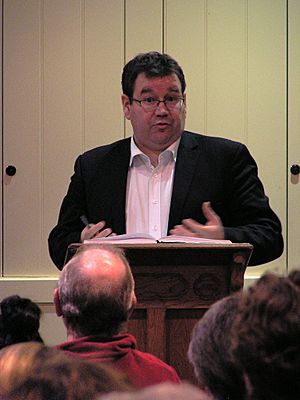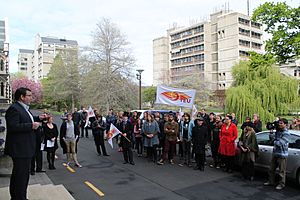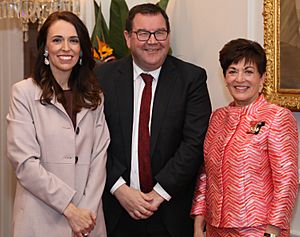Grant Robertson facts for kids
Quick facts for kids
Grant Robertson
MP
|
|||||||||||||||||||||||||||||||||||||||||||||||||||||||
|---|---|---|---|---|---|---|---|---|---|---|---|---|---|---|---|---|---|---|---|---|---|---|---|---|---|---|---|---|---|---|---|---|---|---|---|---|---|---|---|---|---|---|---|---|---|---|---|---|---|---|---|---|---|---|---|
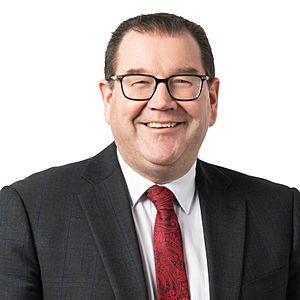
Robertson in 2023
|
|||||||||||||||||||||||||||||||||||||||||||||||||||||||
| 19th Deputy Prime Minister of New Zealand | |||||||||||||||||||||||||||||||||||||||||||||||||||||||
| In office 6 November 2020 – 25 January 2023 |
|||||||||||||||||||||||||||||||||||||||||||||||||||||||
| Prime Minister | Jacinda Ardern | ||||||||||||||||||||||||||||||||||||||||||||||||||||||
| Preceded by | Winston Peters | ||||||||||||||||||||||||||||||||||||||||||||||||||||||
| Succeeded by | Carmel Sepuloni | ||||||||||||||||||||||||||||||||||||||||||||||||||||||
| 29th Minister of Foreign Affairs | |||||||||||||||||||||||||||||||||||||||||||||||||||||||
| In office 11 November 2023 – 27 November 2023 |
|||||||||||||||||||||||||||||||||||||||||||||||||||||||
| Prime Minister | Chris Hipkins | ||||||||||||||||||||||||||||||||||||||||||||||||||||||
| Preceded by | Nanaia Mahuta | ||||||||||||||||||||||||||||||||||||||||||||||||||||||
| Succeeded by | Winston Peters | ||||||||||||||||||||||||||||||||||||||||||||||||||||||
| 12th Minister of Disarmament and Arms Control | |||||||||||||||||||||||||||||||||||||||||||||||||||||||
| In office 11 November 2023 – 27 November 2023 |
|||||||||||||||||||||||||||||||||||||||||||||||||||||||
| Prime Minister | Chris Hipkins | ||||||||||||||||||||||||||||||||||||||||||||||||||||||
| Preceded by | Nanaia Mahuta | ||||||||||||||||||||||||||||||||||||||||||||||||||||||
| Succeeded by | Office abolished | ||||||||||||||||||||||||||||||||||||||||||||||||||||||
| 42nd Minister of Finance | |||||||||||||||||||||||||||||||||||||||||||||||||||||||
| In office 26 October 2017 – 27 November 2023 |
|||||||||||||||||||||||||||||||||||||||||||||||||||||||
| Prime Minister | Jacinda Ardern Chris Hipkins |
||||||||||||||||||||||||||||||||||||||||||||||||||||||
| Preceded by | Steven Joyce | ||||||||||||||||||||||||||||||||||||||||||||||||||||||
| Succeeded by | Nicola Willis | ||||||||||||||||||||||||||||||||||||||||||||||||||||||
| 12th Leader of the House | |||||||||||||||||||||||||||||||||||||||||||||||||||||||
| In office 1 February 2023 – 27 November 2023 Acting: 25 January 2023 – 1 February 2023 |
|||||||||||||||||||||||||||||||||||||||||||||||||||||||
| Prime Minister | Chris Hipkins | ||||||||||||||||||||||||||||||||||||||||||||||||||||||
| Preceded by | Chris Hipkins | ||||||||||||||||||||||||||||||||||||||||||||||||||||||
| Succeeded by | Chris Bishop | ||||||||||||||||||||||||||||||||||||||||||||||||||||||
| 11th Minister for Sport and Recreation | |||||||||||||||||||||||||||||||||||||||||||||||||||||||
| In office 26 October 2017 – 27 November 2023 |
|||||||||||||||||||||||||||||||||||||||||||||||||||||||
| Prime Minister | Jacinda Ardern Chris Hipkins |
||||||||||||||||||||||||||||||||||||||||||||||||||||||
| Preceded by | Jonathan Coleman | ||||||||||||||||||||||||||||||||||||||||||||||||||||||
| Succeeded by | Chris Bishop | ||||||||||||||||||||||||||||||||||||||||||||||||||||||
|
|||||||||||||||||||||||||||||||||||||||||||||||||||||||
| Member of the New Zealand Parliament for Wellington Central |
|||||||||||||||||||||||||||||||||||||||||||||||||||||||
| In office 8 November 2008 – 14 October 2023 |
|||||||||||||||||||||||||||||||||||||||||||||||||||||||
| Preceded by | Marian Hobbs | ||||||||||||||||||||||||||||||||||||||||||||||||||||||
| Succeeded by | Tamatha Paul | ||||||||||||||||||||||||||||||||||||||||||||||||||||||
| Member of the New Zealand Parliament for Labour party list |
|||||||||||||||||||||||||||||||||||||||||||||||||||||||
| Assumed office 14 October 2023 |
|||||||||||||||||||||||||||||||||||||||||||||||||||||||
| Personal details | |||||||||||||||||||||||||||||||||||||||||||||||||||||||
| Born |
Grant Murray Robertson
30 October 1971 Palmerston North, New Zealand |
||||||||||||||||||||||||||||||||||||||||||||||||||||||
| Political party | Labour | ||||||||||||||||||||||||||||||||||||||||||||||||||||||
| Spouse |
Alf Kaiwai
(m. 2009) |
||||||||||||||||||||||||||||||||||||||||||||||||||||||
| Residence | Northland, Wellington | ||||||||||||||||||||||||||||||||||||||||||||||||||||||
| Alma mater | University of Otago | ||||||||||||||||||||||||||||||||||||||||||||||||||||||
Grant Murray Robertson (born 30 October 1971) is a New Zealand politician and member of the Labour Party who served as the minister of finance from 2017 to 2023, as minister of foreign affairs in November 2023, and as the 19th deputy prime minister of New Zealand from 2020 to 2023. He has been the member of Parliament (MP) for Wellington Central since 2008.
Robertson maintained and competed for several leadership positions during the party's stint in opposition following the end of the Fifth Labour Government. He was elected Labour's deputy leader in 2011 under leader David Shearer, and contested the leadership of the party in both 2013 and 2014. Subsequently, Robertson was named the party's finance spokesperson and was ranked third on Labour's party list. Prime Minister Jacinda Ardern appointed him to the finance portfolio in the Sixth Labour Government. As finance minister, Robertson has been prominent in the government's economic response to the COVID-19 pandemic in New Zealand.
Following the 2020 general election he was appointed the 19th Deputy Prime Minister by Prime Minister Ardern. Robertson assumed the role on 6 November, becoming the first openly gay deputy prime minister.
Contents
Early life
Robertson was born in Palmerston North, the youngest of three boys. His Presbyterian family lived in Hastings before settling in South Dunedin. His mother initially stayed at home before later becoming a teacher. His father was an accountant, who was imprisoned in 1991 for stealing around $120,000 from the law firm he worked for. His grandfather Bob Wilkie ran unsuccessfully for Labour in the Wairarapa electorate in 1954 and 1957.
Robertson attended King's High School in Dunedin, where he was head boy. He then studied political studies at the University of Otago, graduating with a Bachelor of Arts with honours in 1995. His honours dissertation studied the restructuring of the New Zealand University Students' Association in the 1980s. Robertson served as President of the Otago University Students' Association in 1993 and as co-president of the New Zealand University Students' Association in 1996.
Professional life
Robertson joined the Ministry of Foreign Affairs and Trade in 1997 after leaving university. His overseas postings included the United Nations in New York. Robertson also managed the NZ Overseas Aid Programme to Samoa – a $7.7 million fund with projects in diverse areas such as basic education, healthcare, public sector capacity building, small business development and the empowerment of women. He left MFAT in 2001.
Robertson returned to New Zealand during the first term of the Fifth Labour Government to work as a ministerial advisor to minister for the environment Marian Hobbs and, later, prime minister Helen Clark. His role in Clark`s office included liaising with the smaller parties supporting the government. He also had a role in designing Labour's interest-free student loans policy, which was credited with winning the election for Labour. Robertson's influence reportedly resulted in him having the nickname "H3", with "H1" and "H2" being Clark and her chief of staff Heather Simpson respectively.
After the 2005 election, Robertson left the prime minister's office to work as a senior research marketing manager for the University of Otago based at the Wellington School of Medicine.
Member of Parliament
| New Zealand Parliament | ||||
| Years | Term | Electorate | List | Party |
| 2008–2011 | 49th | Wellington Central | 46 | Labour |
| 2011–2014 | 50th | Wellington Central | 14 | Labour |
| 2014–2017 | 51st | Wellington Central | 3 | Labour |
| 2017–2020 | 52nd | Wellington Central | 4 | Labour |
| 2020–2023 | 53rd | Wellington Central | 3 | Labour |
| 2023–present | 54th | List | 4 | Labour |
In late 2006, sitting MP for Wellington Central Marian Hobbs announced that she would be retiring at the 2008 general election. Robertson was considered to be a front runner and was subsequently selected unopposed. Robertson ran a well-staffed campaign, based on local issues like the closure of the Crossways Community Centre and threats to the Public Service. He was also involved in the formation of a Wellington inner-city residents' association.
The Labour Party list for the 2008 general election ranked Robertson at number 46.
In the Wellington Central electorate, Robertson defeated National candidate Stephen Franks by 1,904 votes. Robertson's plurality, although far less than the 6,180 vote difference held by his predecessor from the previous election, reflected a large swing in party votes to the National Party from Labour in the electorate and Robertson's status as a non-incumbent candidate.
Robertson quickly rose through the ranks of the Labour party. He joined the front bench of the Labour opposition in February 2011 as health spokesperson and became deputy leader after the party's election loss later that year. After two failed attempts to become Labour leader, he was appointed the third-ranked MP by both David Cunliffe and Andrew Little. Under Jacinda Ardern's premiership from 2017 to 2023, Robertson was Minister of Finance and, for two years, deputy prime minister. He chose not to contest the Labour leadership when Ardern resigned.
Robertson would continue to represent Wellington Central until the 2023 election, where he opted to run as a list-only candidate and was subsequently elected as a list MP.
Early years in opposition
Helen Clark's government was defeated at the 2008 election. Robertson was appointed as the opposition's spokesperson for state services, and associate spokesperson for arts, culture and heritage and foreign affairs by new Labour leader Phil Goff.
In May 2010 Robertson's Ethical Investment (Crown Financial Institutions) Bill was drawn from the member's ballot. According to Robertson, the Bill "sought to have clear and consistent criteria for ethical investment in the legislation that govern our major investment funds such as the Super Fund and ACC." Although the Bill gained support from MPs in the Green and Māori parties, the Bill was defeated at its first reading.
On 15 June 2010, Goff promoted Robertson to be spokesperson for tertiary education and the 20th-ranked Labour MP, the highest of the 2008 intake of Labour MPs to be promoted at that point. In the election year reshuffle, on 2 February 2011, Robertson was further promoted to the front bench to take the health portfolio. Commenting on the promotion, Phil Goff said that Robertson has "made a very strong impact in a very short time" and that he "has a promising future ahead of him."
Following the 2011 election, which Labour lost, and Annette King's resignation as Labour deputy leader, Robertson was elected by the Labour caucus as the new deputy leader under David Shearer. In Shearer's shadow Cabinet, Robertson also served as spokesperson for employment, skills and training, and arts, culture and heritage.
Throughout 2014, Robertson was critical of National Party minister Judith Collins, after she was accused of having a conflict of interest in regards to her visiting the dairy products company Oravida in China. He repeatedly called for her to resign during the Oravida saga, and when Collins later released information to the media about One News journalist Katie Bradford, he reiterated his call for her to resign, claiming she had "lost all perspective".
Leadership challenges, 2013–14
Following Shearer's resignation from the leadership in 2013, Robertson contested the party-wide leadership election. Although Robertson achieved the plurality support from his colleagues in caucus, David Cunliffe garnered more support from party members and affiliates to win the overall vote. Under Cunliffe's leadership, Robertson was the third-ranked Labour MP and held various portfolios including spokesperson for economic development and shadow Leader of the House.
In the September 2014 general election, the Labour Party performed poorly and Cunliffe immediately came under pressure to resign. He was seen by some in the party as taking insufficient blame for the defeat. Media reports suggest that some of the Labour caucus were trying to get Cunliffe to resign so Robertson and Jacinda Ardern could replace the current leadership unopposed. On 26 September, the voting record in the previous leadership race of unions affiliated to Labour was released, showing Cunliffe had won very strong union support in the previous race, and highlighting the challenge for Robertson's bid.
On 28 September, after Cunliffe had signalled his intention to resign, Robertson put his name forward to run for the Labour Party leadership. Robertson pointed to Labour's poor performance in the election as leading him to run: "I couldn't stand by and see the party poll at 24 per cent and not do something now that David's triggered the contest. That's why I've put my name forward." He also argued that the Labour Party needed unity, and he would be a unifying figure, with the support of most of the Labour caucus. Because there were four candidates for the leadership, the Labour Party held a leadership election.
Robertson lost the leadership election to Andrew Little by a small margin, Little receiving 50.52 per cent of the vote to Robertson's 49.48 per cent after the votes from the other unsuccessful candidates had been reallocated. However Robertson once again won the support of most of the caucus, as well as a majority of the membership. After the results were announced, Robertson said he would not seek the Labour Party leadership again in the future.
Opposition finance spokesperson
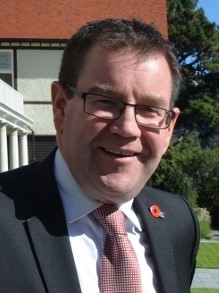
In Andrew Little's shadow cabinet reshuffle of November 2014, Robertson received the finance portfolio, and was ranked number 3 on the Labour list. Robertson chaired the Labour Party's "Future of Work Commission," a two-year-long policy investigation. The final report was released in 2016.
Robertson said his aims for the portfolio were to cut down on the number of policies, and "humanise" the policy.
Sixth Labour Government
Following Labour's formation of a government with New Zealand First and the Greens, Robertson was elected as a Cabinet minister by the Labour Party caucus. He was given the key role of finance minister by Prime Minister Jacinda Ardern, along with the portfolios of minister for sport & recreation and associate minister for arts, culture & heritage.
On 27 June 2019, Robertson was appointed as Minister Responsible for the Earthquake Commission, succeeding Megan Woods.
As finance minister, Robertson was a close confidant of Ardern. During the New Zealand government's COVID-19 response, Robertson would sometimes deputise for Ardern at her daily press conferences. Their close working relationship led some commentators to describe him as her "de facto political deputy," over Labour Party deputy leader Kelvin Davis. He was eventually appointed deputy prime minister after the October 2020 election when deputy party leader Kelvin Davis declined the position. Robertson also retained his portfolios as minister of finance and minister for sport & recreation, and added the ministerial portfolios for infrastructure and racing.
In mid-February 2021, Robertson pulled out of his weekly interview slots with Peter Williams' Magic Talk radio show after Williams questioned him about his views on the implications of the World Economic Forum's Great Reset for New Zealand. Robertson reportedly stated that he would no longer appear on the show since he did not want to "shoot down conspiracy theories."
In December 2022 commentator Morgan Godfery lauded his handling of the finance portfolio.
Prime Minister Jacinda Ardern announced her resignation on 19 January 2023. Robertson immediately responded that he would not be seeking election as her successor but that he would contest the 2023 general election. He also stood down as deputy prime minister, but continued as finance minister and also became Leader of the House and, after Cyclone Gabrielle struck parts of New Zealand, Minister for Cyclone Recovery. He was briefly Minister of Foreign Affairs in November 2023 after incumbent Nanaia Mahuta lost her re-election bid.
On 5 December 2023, Robertson was granted retention of the title The Honourable, in recognition of his term as a member of the Executive Council.
Personal life
Robertson lives in Northland, Wellington, with his partner Alf, whom he met through playing rugby together for the Wellington-based Krazy Knights, New Zealand's first gay rugby team. After 10 years in a relationship, they held a civil union ceremony in January 2009.
See also
- Electoral history of Grant Robertson


